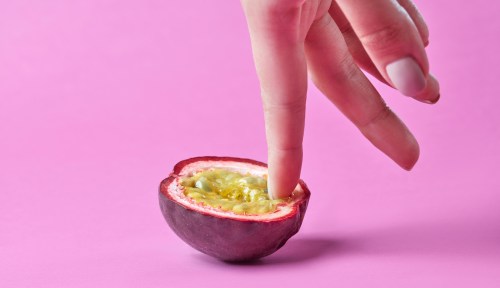Can Regularly Masturbating Replace a Person’s Desire for Partnered Sex? Sexologists Weigh In
While regularly masturbating cannot replace partnered sex, it does have effects on how much (or how little) you're inclined to search for it.

Masturbating offers all kinds of healthy benefits: It can help you love and accept your body, and that love and acceptance, in turn, can have a positive impact on your self-image and well-being. Masturbating is also associated with lowered blood pressure, decreased pain from menstrual cramps, and reduced feelings of stress and anxiety, says Chanta Blue, LCSW, a sexuality and relationship therapist. But—as anyone who’s ever wondered whether regularly masturbating can replace a person’s desire for partnered sex might want to know—with regards to the benefits of masturbating, does the limit exist?
Experts in This Article
sex therapist and licensed clinical social worker
AASECT-certified sex educator and author of Tickle His Pickle: Hands On Guide To Penis Pleasing
Good news: Though masturbation is indeed a great tool for addressing needs for sexual release and pleasure, experts agree that it does not replace a person’s desire for partnered sex—that is, unless you fall on the asexuality spectrum and thus never desire partnered sex, caveats Blue. “Humans are naturally social beings,” says Blue. “The need for social connections varies for each individual, but studies have shown that people who engage with others more have longer life expectancies and reduced health concerns.” With this in mind, we can assume that the biological predisposition to connect extends to sexual practices in many folks—regardless of how often they practice self-pleasure.
“One can never truly replace the other.” —Sadie Allison, PhD, on masturbation and partnered sex
Sexologist and co-founder of GoLove CBD lubricant Sadie Allison, PhD, agrees. Masturbation, she says, is “an opportunity for us to discover what we like and don’t like, which can help make partnered sex much more pleasurable.” But since human connection is an can be an integral part of sex for many folks, masturbating and partnered sex fulfill different needs. “One can never truly replace the other,” she says.
While regularly masturbating won’t replace a desire for partnered sex, though, a self-pleasure practice can impact that desire. Of course, individual preferences play a large part in how regular masturbation increases or decreases our desire for partnered sex (keep in mind folks have different desires for sex in general), so it all depends on the person in question.
With regard to casual sex, in particular, Dr. Allison says, regular masturbation could lead a person to seek it out less frequently, due to the lack of emotional connection such unions tend to bring about. “For some people, casual sex lacks the spark that sex with a more established partner might have,” she says.
In fact, findings from Match’s forthcoming 2021 Singles in America survey of 5,000 individuals backs up the idea that self-pleasure can decrease desire for sex without a deeper emotional connection present. It found that one in three singles during the pandemic learned how to better pleasure themselves and that 78 percent of folks claim they are picky when it comes to picking a partner for casual sex. The results also found that folks prefer meaningful partnered sex. So, while that uptick in masturbation may compromise a desire for casual sex, it crucially does not remove a desire for meaningful partnered sex.
With this in mind, if you know that casual sex offers little pleasure for you—whether because you don’t want to worry about another person, you don’t want to explain to someone new what you’re into, or otherwise—it makes sense that a healthy masturbation practice could lead you to cut down on how often you seek out casual sex partners, Dr. Allison says. “Some people might find the presence of another person, especially a casual stranger, stressful and uncomfortable,” she adds, which could, in turn, lead them to prefer self-pleasure until they find a partner to whom they feel more connected.
That said, Blue contends that regular masturbation could also stand to increase some people’s desire for casual sex, which, in this case, is due to the chemical reaction that we have when we self-pleasure. “When we orgasm, [oxytocin and dopamine] are released,” says Blue. “The release of these chemicals during masturbation and other sexual behaviors creates a positive association with those behaviors.” That positive association, she says, “will then make us want to engage in those activities more and find additional ways to get that same feeling.” Basically, chemically speaking, more might be more when it comes to sex—no matter how you engage with it—so long as orgasm is reached.
All of that said, you shouldn’t feel any type of way if your masturbation routines lead you to want more or less partnered sex—casual, or otherwise—because we really are all different. “It’s always good to remember that when it comes to sex and pleasure, there is no ‘normal,’” Dr. Allison says.
Oh hi! You look like someone who loves free workouts, discounts for cutting-edge wellness brands, and exclusive Well+Good content. Sign up for Well+, our online community of wellness insiders, and unlock your rewards instantly.
Sign Up for Our Daily Newsletter
Get all the latest in wellness, trends, food, fitness, beauty, and more delivered right to your inbox.
Got it, you've been added to our email list.










